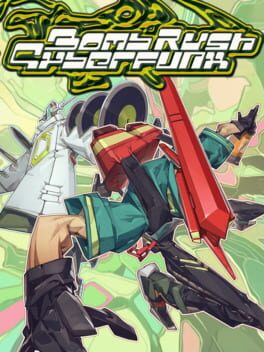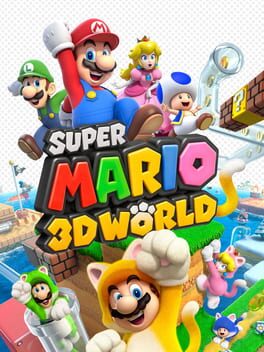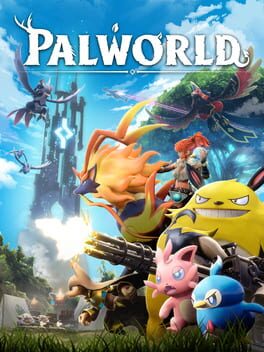SashaFellOver
167 reviews liked by SashaFellOver
Animal Well
2024
Animal Well
2024
Animal Well
2024
Dark Souls III
2016
Dark Souls III
2016
Bomb Rush Cyberfunk
2023
Bomb Rush Cyberfunk
2023
My first thought was that Bomb Rush Cyberfunk was just going to be a straight spiritual successor to Jet Set Radio Future (which would have been a letdown considering my three weeks of original Jet Set Radio prep), but I'm pleasantly surprised by the blend of mechanics presented! In reality, Bomb Rush Cyberfunk takes the overall structure and aesthetic from Future while borrowing more heavily from original Jet Set Radio's tight level design and intricate scoring mechanics, and dare I say, actually improves upon certain aspects. It does have a few underdeveloped features as a result of its experimentation, but overall, not a bad first attempt by Team Reptile!
One issue that apparently escaped my notice the first time around (I replayed Future recently just to confirm this) was that Future's extremely linear and stretched-out levels resulted in tons of backtracking upon missing objectives/falling off the stage, and led to fairly rigid approaches that really tried my patience upon additional loops. This is fortunately not the case with Bomb Rush Cyberfunk: levels are generally a lot more open with many more shortcuts and are spaced apart carefully to where traversal feels much more free-form. It more closely resembles original Jet Set Radio, especially when you consider how its momentum mechanics complement this design. Future made the speed fairly easy to obtain: jump onto a rail regardless of your momentum, then keep mashing trick to accelerate and never slow down. On the other hand, original Jet Set Radio became well-known for how slow your character would move about unless you actively utilized rails and grindable walls to speed up, and Bomb Rush Cyberfunk takes a modern twist: you need to maintain momentum by either rail grinding and leaning into corners for speed boosts, or by using grounded manuals combined with boost (refreshed from performing tricks) to retain speed.
The momentum mechanics go hand-in-hand with the game's combo system. After thoroughly exploring levels to spray graffiti spots for "rep" and completing subsequent score and movement-tech challenges from opposing crew members, your crew must finally confront opposing crews in a crew battle, outscoring them with trick combos in their own territory. The scoring and trick system improvises upon both original Jet Set Radio and Future: in both games, the safest way to score trick points was abusing infinite grind loops and repeating the same tricks/movement over and over. However, Bomb Rush Cyberfunk turns this on its head: you don't get tons of points for doing the same tricks ad-nauseam (since trick value decreases and eventually levels off when used more and more). Instead, the main key to getting points is increasing the multiplier by utilizing unique features of the stage: that is, leaning into tight corners on grindable rails, wall-riding billboards, and going up half-pipe ramps (which are improved over the original game since you can manual up ramps and then air boost off into manuals/rail and wall-grinds, so they can function as part of a combo). The key word is "unique," since utilizing the same set-piece in a held combo will not give additional multipliers, and the same goes for graffiti spots that can now also be resprayed as one-time trick bonuses during continuous combos. As a result, the trick and multiplier staling incentivizes players to fully explore and utilize every set-piece present upon the open stages to create massive combos, made easier thanks to the mid-air dash (which also lets you alter airborne momentum once) and the manual. The only downside here is that the game's circumstances never become difficult enough to necessitate this trick optimization; the story crew battles are pretty easy and I was leapfrogging them using the above strategy (i.e. while other crews were floundering around several hundred thousand, I was well beyond a couple million in score), so unless players are trying to crack the tougher post-game score barriers for optional characters/achievements, they may never need to lean on these strategies at all.
The lack of difficulty serves as a microcosm of this game's unfortunate trend: Bomb Rush Cyberfunk certainly innovates upon many features from the Jet Set Radio games, but I find a few to be undercooked or lacking in execution. The combat's one example: it's not a bad idea in theory (using tricks to both deal damage and maintain score/momentum) and in fact has been proposed before, but its implementation leaves something to be desired. Attacking enemies feels like it has little impact because of the muffled sound-effects, akin to slapping a wet sock on a table. Also, most enemies can be defeated with a single grounded attack into an immediate "corkscrew" jump and then spray-painted in the air. While this graffiti coup de grâce never gets old, it does feel quite difficult in practice comboing in and out of this linearizing technique (since you need to be standing and off your skates to execute, breaking any combo potential), so combat never really flows and the mandatory combat sections in-story feel somewhat superfluous.
Adjacent to this is the heat system, a spin on original Jet Set Radio's enemy escalation during story stages. As your character goes about spraying graffiti, police forces begin to spawn in tougher waves: for example, wave one consists of simple grounded officers with batons and pistols, wave two activates turrets that home-in on the player with chains and slow their movement, and wave three brings in armored forces that can block attacks. I found most of these enemies to be mere nuisances: you can easily skate around and dodge most attacks (except for the turrets, which can be easily disabled with a single attack + spray), and since enemies can't be easily comboed for points and will respawn continuously upon defeat anyways, it's best to just ignore them as is. Again, this is fairly similar to original Jet Set Radio's strategy of outmanuevering enemies since foes there were active time sinks, so this doesn't bother me greatly. Unfortunately, this creates friction with Bomb Rush Cyberfunk's exploration, and not just in the sense that enemies will impede progress. The game requires you to swap between the three different types of movestyle for their different abilities: skateboards can ride on extendable fire hydrants to extend them vertically and reach heights, inline skates can skid on glass to shatter specific ceilings, and bikes can open special garage doors. The only way to switch between characters/movestyles is to go to checkerboard tiles and dance, but the game prohibits switching when there's "too much heat." Thus, you have to de-escalate the heat gauge by entering orange porta-potties (unmarked on the map, so hopefully you remember their locations!). However, they also lock up after a single use, so players have to either outright leave the stages or find a different porta-potty elsewhere to reopen old porta-potties for enemy despawning. I think this could have easily been improved if the heat gauge slowly decreased over time from successful enemy evasion.
Even with my criticisms, Bomb Rush Cyberfunk was definitely worth the three year wait. The story isn't anything mindblowing, but it's got some nice twists that are conveyed via these surreal platforming sequences that are a cross between the time rifts from A Hat in Time and a Psychonauts fever dream. I'm pleasantly surprised by a good chunk of the soundtrack too: Hideki Naganuma's three contributions are the obvious highlights, but other tracks like 2Mello's I Wanna Kno and Sebastian Knight's Feel the Funk more than hold their own weight. It's a good mix of upbeat sampledelia hip-hop and chill ambient tunes, with my only real complaint being the lack of guitar-heavy rock tracks like Magical Girl or Statement of Intent... RIP Guitar Vader. Finally, I more than got my playtime's worth out of 100%ing the game, considering all the hidden areas and collectibles to find and just how much fun I had figuring out new ways to string together ridiculous combos. Despite the game's various areas of improvement, I find Bomb Rush Cyberfunk to be a fantastic fresh take upon a beloved franchise that isn't just a homage to Jet Set Radio, but a love letter to classic Y2K counter-culture and skating games as a whole. If you're not a prior fan of the franchise, this might not be the game to change your mind, but if you are, then I see no reason why you wouldn't find some enjoyment out of it. It's no surprise that fans absolutely ate this up, with excitement for the franchise reaching a new fever pitch. Your move, SEGA. Let's see if you guys still understand the concept of love.
One issue that apparently escaped my notice the first time around (I replayed Future recently just to confirm this) was that Future's extremely linear and stretched-out levels resulted in tons of backtracking upon missing objectives/falling off the stage, and led to fairly rigid approaches that really tried my patience upon additional loops. This is fortunately not the case with Bomb Rush Cyberfunk: levels are generally a lot more open with many more shortcuts and are spaced apart carefully to where traversal feels much more free-form. It more closely resembles original Jet Set Radio, especially when you consider how its momentum mechanics complement this design. Future made the speed fairly easy to obtain: jump onto a rail regardless of your momentum, then keep mashing trick to accelerate and never slow down. On the other hand, original Jet Set Radio became well-known for how slow your character would move about unless you actively utilized rails and grindable walls to speed up, and Bomb Rush Cyberfunk takes a modern twist: you need to maintain momentum by either rail grinding and leaning into corners for speed boosts, or by using grounded manuals combined with boost (refreshed from performing tricks) to retain speed.
The momentum mechanics go hand-in-hand with the game's combo system. After thoroughly exploring levels to spray graffiti spots for "rep" and completing subsequent score and movement-tech challenges from opposing crew members, your crew must finally confront opposing crews in a crew battle, outscoring them with trick combos in their own territory. The scoring and trick system improvises upon both original Jet Set Radio and Future: in both games, the safest way to score trick points was abusing infinite grind loops and repeating the same tricks/movement over and over. However, Bomb Rush Cyberfunk turns this on its head: you don't get tons of points for doing the same tricks ad-nauseam (since trick value decreases and eventually levels off when used more and more). Instead, the main key to getting points is increasing the multiplier by utilizing unique features of the stage: that is, leaning into tight corners on grindable rails, wall-riding billboards, and going up half-pipe ramps (which are improved over the original game since you can manual up ramps and then air boost off into manuals/rail and wall-grinds, so they can function as part of a combo). The key word is "unique," since utilizing the same set-piece in a held combo will not give additional multipliers, and the same goes for graffiti spots that can now also be resprayed as one-time trick bonuses during continuous combos. As a result, the trick and multiplier staling incentivizes players to fully explore and utilize every set-piece present upon the open stages to create massive combos, made easier thanks to the mid-air dash (which also lets you alter airborne momentum once) and the manual. The only downside here is that the game's circumstances never become difficult enough to necessitate this trick optimization; the story crew battles are pretty easy and I was leapfrogging them using the above strategy (i.e. while other crews were floundering around several hundred thousand, I was well beyond a couple million in score), so unless players are trying to crack the tougher post-game score barriers for optional characters/achievements, they may never need to lean on these strategies at all.
The lack of difficulty serves as a microcosm of this game's unfortunate trend: Bomb Rush Cyberfunk certainly innovates upon many features from the Jet Set Radio games, but I find a few to be undercooked or lacking in execution. The combat's one example: it's not a bad idea in theory (using tricks to both deal damage and maintain score/momentum) and in fact has been proposed before, but its implementation leaves something to be desired. Attacking enemies feels like it has little impact because of the muffled sound-effects, akin to slapping a wet sock on a table. Also, most enemies can be defeated with a single grounded attack into an immediate "corkscrew" jump and then spray-painted in the air. While this graffiti coup de grâce never gets old, it does feel quite difficult in practice comboing in and out of this linearizing technique (since you need to be standing and off your skates to execute, breaking any combo potential), so combat never really flows and the mandatory combat sections in-story feel somewhat superfluous.
Adjacent to this is the heat system, a spin on original Jet Set Radio's enemy escalation during story stages. As your character goes about spraying graffiti, police forces begin to spawn in tougher waves: for example, wave one consists of simple grounded officers with batons and pistols, wave two activates turrets that home-in on the player with chains and slow their movement, and wave three brings in armored forces that can block attacks. I found most of these enemies to be mere nuisances: you can easily skate around and dodge most attacks (except for the turrets, which can be easily disabled with a single attack + spray), and since enemies can't be easily comboed for points and will respawn continuously upon defeat anyways, it's best to just ignore them as is. Again, this is fairly similar to original Jet Set Radio's strategy of outmanuevering enemies since foes there were active time sinks, so this doesn't bother me greatly. Unfortunately, this creates friction with Bomb Rush Cyberfunk's exploration, and not just in the sense that enemies will impede progress. The game requires you to swap between the three different types of movestyle for their different abilities: skateboards can ride on extendable fire hydrants to extend them vertically and reach heights, inline skates can skid on glass to shatter specific ceilings, and bikes can open special garage doors. The only way to switch between characters/movestyles is to go to checkerboard tiles and dance, but the game prohibits switching when there's "too much heat." Thus, you have to de-escalate the heat gauge by entering orange porta-potties (unmarked on the map, so hopefully you remember their locations!). However, they also lock up after a single use, so players have to either outright leave the stages or find a different porta-potty elsewhere to reopen old porta-potties for enemy despawning. I think this could have easily been improved if the heat gauge slowly decreased over time from successful enemy evasion.
Even with my criticisms, Bomb Rush Cyberfunk was definitely worth the three year wait. The story isn't anything mindblowing, but it's got some nice twists that are conveyed via these surreal platforming sequences that are a cross between the time rifts from A Hat in Time and a Psychonauts fever dream. I'm pleasantly surprised by a good chunk of the soundtrack too: Hideki Naganuma's three contributions are the obvious highlights, but other tracks like 2Mello's I Wanna Kno and Sebastian Knight's Feel the Funk more than hold their own weight. It's a good mix of upbeat sampledelia hip-hop and chill ambient tunes, with my only real complaint being the lack of guitar-heavy rock tracks like Magical Girl or Statement of Intent... RIP Guitar Vader. Finally, I more than got my playtime's worth out of 100%ing the game, considering all the hidden areas and collectibles to find and just how much fun I had figuring out new ways to string together ridiculous combos. Despite the game's various areas of improvement, I find Bomb Rush Cyberfunk to be a fantastic fresh take upon a beloved franchise that isn't just a homage to Jet Set Radio, but a love letter to classic Y2K counter-culture and skating games as a whole. If you're not a prior fan of the franchise, this might not be the game to change your mind, but if you are, then I see no reason why you wouldn't find some enjoyment out of it. It's no surprise that fans absolutely ate this up, with excitement for the franchise reaching a new fever pitch. Your move, SEGA. Let's see if you guys still understand the concept of love.
Super Mario 3D World
2013
A new timeless classic. Full of imaginative level design and whimsy. In every level there is a reason to smile from the beginning until the end. This game is a cozy nostalgic blanket that will make you feel 20 years younger. A stark reminder that time is fleeting and that death shall come for us all.





